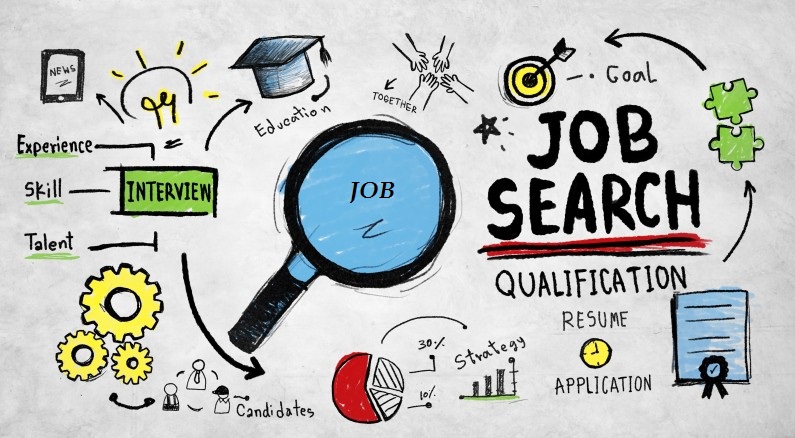


The job hunt is everyone's target once they come out of their studies or college. But what kind of job you need to join, or how the job market is today is what no one cares to look at.
While the jobs market may have improved but there is still often tough competition for the top roles. It’s a horrible feeling to miss out on a job that you really wanted so we’ve put together these tips to help you stand out as the best candidate and secure your ideal position.
This might sound obvious but it’s surprising the number of people who are looking for a new role without really being clear about what an ideal position looks like. If you’re unhappy in your current role, or unemployed, then any job probably seems like a better option but it makes sense to think through what you’re seeking in your next role, and what factors are important to you in terms of job satisfaction.
What level of responsibility are you looking for? What salary do you need? What length of commute would you be happy with? What sort of company do you want to work for? Knowing what are deal breakers for you, and the elements you’d be willing to compromise on, will help you identify what constitutes an ideal position for you and that’s a key first step in being able to secure it!
When you’re actively looking for a job it can be hard to keep track of which jobs you’ve applied for, from which job boards and with which recruiters. This is why it’s crucial to stay organized as there’s nothing more off-putting for a recruiter or company than speaking with a candidate who sounds unsure of whether they’ve applied for a particular role or not. They naturally want to feel like the role they’re calling to talk to you about is the most important one on your radar.
Keep a spreadsheet to record your applications including details such as job title, date applied, where you applied for it, name of the recruiter/hiring manager/company including whatever contact information was supplied and a column to list the status of the application e.g. awaiting feedback, rejected, first interview etc. This will also help you to identify which opportunities you need to follow up with if you haven’t received any feedback by a certain point.
They say it’s who you know, not what you know and that’s why it’s important to develop relationships with people who can help you land your ideal job. This can include recruiters, people within companies you’d like to work for, people you’ve previously worked with, people in your industry, those you studied with etc.
When you’re busy it can be easy to lose touch with people but social media can help you stay connected. First of all, look to reignite any existing relationships you have. Don’t come straight out and ask if they can help you secure a new job. You can send them a note saying it’s been a while and ask how they are and what they’re up to or comment on something they’ve posted online / share something with them that you think would be of interest. You can then look for other relevant people to connect with. Again, keep your initial outreach friendly, rather than going straight in with ‘can you help me get a new job?’ You should also look for opportunities to develop relationships offline, such as at industry events.
In terms of building good relationships with recruiters, the key is regular and honest communication. Let them know what you’re looking for, what your current situation is, what interviews you’re going on etc. Also, make sure you respond as soon as you can to any opportunities they present to you. If you’re going to be unavailable for a prolonged period of time then let them know this in advance so they don’t think you’re no longer interested in a new role.
If you’re looking for a new job you need to make sure you can be found online and are saying things that portray you in a positive way. Complete your profile information on all social sites you’re on so that you’ll be returned in any recruiter searches. Also, do a Google search for yourself to see what’s returned and if there’s anything that needs removing or privacy settings that need altering.
You want to refrain from bad mouthing your current employer and having any inappropriate photos visible to someone you’re not connected with. Instead, you should be looking to share industry insights, blogging about relevant issues, commenting on existing blogs etc. These things will make you look like you take an active interest in your career and are knowledgeable on current news.
Use the job description to make sure that your CV clearly details that you have the skills that this role requires. It will also help you to prioritize the order that you show these skills in and whether there are elements that you can remove for this opportunity. You don’t need a completely new CV for each role you apply to, but you should tweak your master copy so that the recruiter can see quickly what a great fit you are for this position. This is especially important for CVs that go through ATS systems as they’ll be looking for certain keywords, often ones that are mentioned in the job advert.
You should also make sure that your CV contains quantified achievements, rather than a list of responsibilities e.g. increased profitability by 24% over the fiscal year.
Some people save this for the interview stage but it’s important before then. Doing your research about a company will help you determine whether it’s one that you’d like to work for, and if it is then you can use it in your cover letter to help you stand out.
There’s some debate about whether cover letters are necessary anymore but why miss out on an additional opportunity to sell yourself? In this short note, you can detail why you’re excited about the role and why you think you’d be good at it. This is where you can draw on some insights you’ve found from your research.
If you’ve made it to the interview stage then now is your ultimate chance to shine. Through your research and the job description (plus your conversations with the recruiter if this is how you found the job), you should have an idea of why this vacancy has been created and what the company needs from this person. Use these insights to prepare examples of your experience which showcase that you can provide what they need.
There’s nothing worse in an interview than being at a loss to offer an example of where you’ve demonstrated a particular required skill or behavior so doing some thorough preparation before should help ensure that this doesn’t happen.
If you’re working with a recruiter make sure to provide the feedback quickly on how the interview went and on any areas where you feel that you may not have come across as well as you would have liked. So that they can pass this to the employer when they’re speaking with them and it might help to overcome any potential doubts or questions they had about you.
However, if you found the job directly with the employer then be sure to send a concise thank you email which reiterates your interest in the role. Where possible reference something that was said in the interview, for example; It sounds like an exciting time to join the company with the recent acquisition of Z, and I would relish the opportunity to help you achieve your growth plans.
...
Read More

The biggest question roaming around the industry is why one should go permanent rather than temporary? Well, there are many cons and pros defending the question; more to it the people in the room think that they may earn more with permanent positions along with many benefits. In some instances, this may be in another case. You have to look at the amount of work over a whole year and the bigger picture. While this might not always the best thing to jump into.
Taking a good break and moving in the right direction and up the ladder will definitely bring good progress in your career. This is what you see a lot in senior and permanent employees; who actually earn almost as much as they can from their professional and personal experience. More to salary; you will also entitle to have the below-mentioned privileges’ which include:

Here are few pros and cons of Temp Vs Perm
Temporary
Transparency & Flexibility

Most essential reasons most candidates look before they step in any organization is transparency and flexibility. Both of the reasons are cited by many candidates who are looking for Temp positions. The length of the projects they will be put in will give the exact picture about the time frame they will stay in the temporary project; but in addition, there are plenty of options like project contract extensions, holiday’s, flexibility in the working hours and more are attracting the jobseekers to opt for temp positions. Temp work is always a good option for those who want a bit of freedom and flexibility in their role.
Financial Opening

Temp work is not just about flexibility and transparency, but the financial opportunities for temp workers are high and potentially more compared to the permanent employees; even the employers don’t need to be anxious about sick pay, holidays or pensions, and paying cash free for daily rate while as in permanent positions.
Diversity & Practice

Many candidates like to opt for temp projects as they have diverse opportunities to go with and they can easily plan their lifestyle along with choosing the right fit role with good exposure. There are fewer politics to worry about and no need to think about the benefits that come of gaining experience with diverse employers. Here you will have ample of opportunities to pick and work with.
Employer’s Choice

The best reasons that the contract market continues to thrive today is - it’s great for employers too; they have a choice to pick the employee with their required requirements. With restrictions in their place, the hiring process for full-time is tougher than the temp positions. Filling the requirement for a certain period is manageable by offering good package and benefits. However, for many employers, the contract can be a good alternative; as contractors often find themselves in high demand.
Permanent
Association & Safety

Today if we see, many employees are looking for these two reasons which are associated with their jobs and provide them the safety they are looking in for. Close association and safety are two essential things for the employees in today’s work atmosphere. Both need to be closely associated with any kind of work you are going with. Most of the employees like to pick permanent jobs for good association and safety. Whether they’re actual or apparent these kinds of benefits are more usually associated with permanent roles than temp positions.
Getting Further

A permanent position is more defined than temp and often offer strong career path than contract roles with clear opportunities towards the advancement within the organization. Moreover, the permanent employees are more likely to make a choice on the rewards of their hard work on a project than temp, who may previously be on their next project when the approvals are handed out.
Secured Pay

While choosing the temp role can add big numbers in your pay and make your financial map high. However, a guaranteed pay cheque by the end of each month is a huge incentive for permanent employees, along with the benefits that come within – holiday pay, sick pay and any other bonuses the organization might offer.
Know where you like to land

Though flexibility, diversity, financial stability, are great for some employees, but what others are thinking to opt is what we need to prefer to know and where they are based and what are they doing on a daily basis. However, the permanent roles tend to offer to more locked-down employment practice.
What to opt?
While it is impossible to predict whether a temp or perm, obviously, there’s no ultimate answer to this question - the right answer is the one – that right fits for you.
But whichever side you like to choose, we will help you fit in that role as we being the best recruitment partners for many years now.
...
Read More

Stressing yourselves and struggling to grab the dream job is not that tough today if you carry confidence, knowledge and most importantly when you are a team player with all the skills in you. You need to stand in the competition and it can be strong when applying and be interviewing for your dream job. But it cannot be a stop to anyone when you have the desired skills. It’s a pretty rare thing that you are the only candidate for a job, in those cases, you will be approached by a company anyway, be rest assured and face the questions and the completion of the interview process. Try to get the edge on the other candidates who are with you by analyzing their skills and if they carry any extra degree. But how to do that is what we are speaking out on this blog. Try these simple ideas — here are some ways to help you stand-out from the other candidates.
Your Curriculum Vitae (CV)

Reaching out the consultancy or an employer is essential and the first challenge for anyone to get their dream job. But, this will only happen when your CV represents you better than what you are. This plays a vital role to get an interview call or a mail, and then it’s your task to present yourself and grab the job. Make sure that your CV is tailored to the job spec ified and the role offered.
Don’t Fail to prepare & prepare well to fail

Once your interview is secured, and you are all set to join your dream job. Set aside time to prepare well and try to get all the relevant information about the company you are joining. This is the exercise you need to follow before you are hitting the interview and the time you are joining the company too. Before you are hitting the interview you need to make a note of the company’s history, teams, what are they into and what they do to others?
STAR Method

This is a simple method, which will help you to answer the most challenging and competency based questions. Today organizations are very keen to know what was the situation that you have met, how did you deal with it and what was the solution you gave. This is the stage you can prove yourself and how your employer did grade you to be the best player.
A situation or Task: Describe the situation you were confronted or the task; that you needed to accomplish in a shorter time.
Action: Brief how you reacted towards the situation and what you did; this is where the interviewer will be looking for the explanation and how you used skills and attribute that they are testing. Make sure that you take the personal approach as the interviewer needs to hear about your actions, not the teams.
Result: Explain how it all ended. Use this as an opportunity to describe what you accomplished and learned from the situation.
Appearance

No matter what the role is or the organization you are attending; remember that for all little things you need to pay. Make sure for the grammar check, spell check in your CV and what you are wearing. Do not select the clothes which make you feel sick, wear right clothes that fit you the best.
Most of the people aren't going to notice the difference, but some will, of course, do it; but don't go to impress people, which will land you somewhere else. The most important thing is to look professional. Tattoos covered up. One pair of earrings for women; or none is also fine, no earrings for men. No facial piercings at all .
Attitude

Your attitude plays everything when you are facing interviewer. Carry positive body language and attitude. Greet, smile and give the interviewer a firm handshake when you meet him or her. Make eye contact and actively engage with the interviewer, and lean slightly towards the interviewer to show your engagement in the conversation. Do not look up or down, not even to the sides of the interviewer when speaking, as this can be interpreted as disinterest or apathy. Thank the interviewer sincerely for the time and opportunity and express your excitement about the employment possibility.
...
Read More

Whenever we go for any interview, it is ever time we think that what is going to happen and what questions do we need to answer. In my few years of experience, I have found few questions to be best to ask in an interview. “It’s not about me, though, it’s about you”. Here are those questions you need to ask in a job interview. I have put this list collectively because so often we can forget what an interview’s all about. It sure feels like it’s about you, but it’s really not.
An interview is in fact about how you can help your future superior and future employer succeed. You can find out what their requirements and hopes are and are they matching up with your background and experience with what they need.
Overlooking these basic specifics about the interview is easy. There will be much else going on in your work, your life, and in your job search, so you often miss out these basic things which will result very bad from the interviewer’s point of view; which is not at all a good sign for you.
Look into some conversations in between, and explore what will you get when you ask meaningful questions.
When I asked how do I get a “gold star” when an evaluation is going on, the interviewers’ faces lit up!” You will never know where it will land you, but I can tell, if you ask such meaningful questions at the end, you may get a positive result.
Ask the interviewer about his leadership style and reward system, he will feel good and his face lit up like a Christmas tree, and land you in great.
After he answers the question, say “how can I help you receive your next promotion?”, he will begin to give you advice on how you should negotiate for a higher starting salary.
And that’s exactly the point. By asking these type of questions, which focus on the needs, personality, and preferences of your future boss and future employer, you’re demonstrating that you are somebody who is genuinely interested in their well-being. And the more interest we show in others, the more promise they show to aiding our cause.
Let’s go into the topic and look at best interview questions. My aim here is to arm you with easy-to-ask, revealing-to-answer questions for you to take with you to an interview:

I hope you find these questions useful in your interviews!
...
Read More

Use social media to make your job search more effective and efficient. We can see that social media profiles have become an important part of our everyday life, whatever technology or platform you choose you’re likely to have a few different accounts online. You can create your own brand by making your profiles online, especially when working in digital it is very important to realize what you add online!
Dos

Don'ts
As long as you’re conscious about what you put online, you’re on the right track! If you have any questions, don’t be shy! Head over to our LinkedIn, Twitter, Facebook or Google+. We practice what we moralize!, and drop us a line!
...
Read More